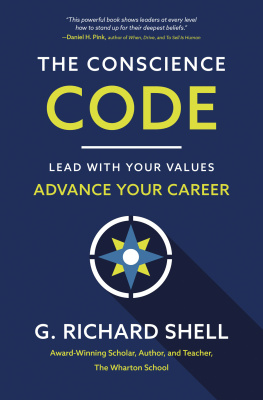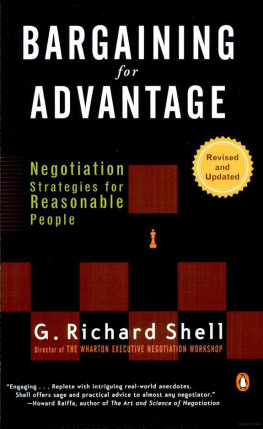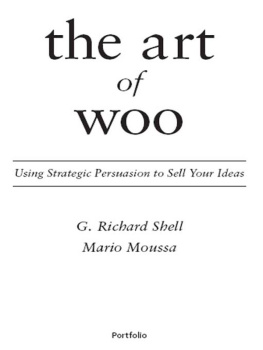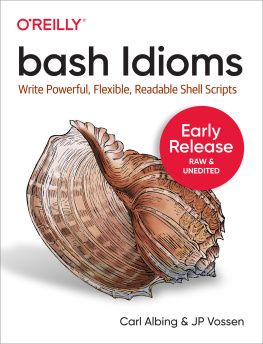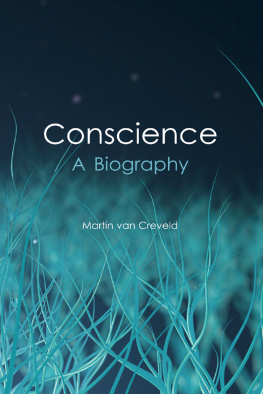Praise forThe Conscience Code
Every organization talks about values. But how can we uphold those values when bosses and peers are behaving badly? The Conscience Code delivers the answer. This powerful and practical book brings the science of persuasion to the problem of doing the right thingshowing leaders at every level how to stand up for their deepest beliefs.
Daniel H. Pink, Author ofWHEN, DRIVE,andTO SELL IS HUMAN
Leading in the twenty-first century without a conscience is like trying to fly a plane without wings. The Conscience Code shows you how to turn your beliefs into action and take flight.
Yancey Strickler, Cofounder and Former CEO of Kickstarter, Founder of the Bento Society, and Author ofThis Could Be Our Future
A must-read in todays turbulent times. Indeed, the high road is the only road. Richard Shell will help you get there and stay there.
Douglas R. Conant, Founder of ConantLeadership,New York TimesandWall Street JournalBestselling Author, Former Chairman of Avon Products, and Former President and CEO of Campbell Soup Company
Shell demonstrates that good ethics is not only good business but is also the foundation for personal and professional success. His real-world examples and research-based observations make this book a keeper for every leader.
F. William McNabb, Former Chairman and CEO of Vanguard
Engaging, clear, and practicalThe Conscience Code is an outstanding guide to leading and living responsibly.
Joseph L. Badaracco, John Shad Professor of Business Ethics at Harvard Business School
Jam-packed with real-world examples of values conflicts at work, Richard Shells book offers practical career guidance for every person of conscience who wants to take actioneffectivelyon their values. This book is an inspirational, pragmatic handbook for living a fulfilled, values-driven life.
Mary C. Gentile, PhD, Author ofGiving Voice To Values: How To Speak Your Mind When You Know Whats Right,University of Virginia Darden School of Business
Ethispheres research has shown that a value-based approach to business significantly outperforms the competition. Richard Shells The Conscience Code provides the roadmap every employee can follow to become a committed champion for that all-important mission. It should be required reading for every global firm seeking to empower its workforce to be a force for good.
Tim Erblich, CEO of Ethisphere Institute and Former President of NYSE Governance Services
The Conscience Code offers important advice to leaders facing decisions that challenge their core beliefs. Doing the right thing isnt always easy. Richard Shells examples show us that staying true to ones values leads to genuine, long-term success.
Adam H. Schechter, Chairman and CEO of LabCorp
Think business ethics are purely academic? Richard Shells new book The Conscience Code puts this longstanding myth to rest! Reflecting on decades of teaching and consulting, Shell details just how critical moral issues are to successful corporate leadership, organizational culture, business strategy, and negotiation. The Conscience Code is a must-read for all those committed to aligning business with integrity, responsibility, and accountability.
Larry Zicklin, Former Managing Partner and Chairman of Neuberger Berman
Ebook Instructions
In this ebook edition, please use your devices note-taking function to record your thoughts wherever you see the bracketed instructions [Your Notes]. Use your devices highlighting function to record your response whenever you are asked to checkmark, circle, underline, or otherwise indicate your answer(s).
Information about External Hyperlinks in this ebook
Please note that the endnotes in this ebook may contain hyperlinks to external websites as part of bibliographic citations. These hyperlinks have not been activated by the publisher, who cannot verify the accuracy of these links beyond the date of publication
For my late friend and mentor,
Dr. Simon Auster
CONTENTS
Guide
Start where you are, use what you have, do what you can.
Arthur Ashe, tennis champion and social justice activist
I wrote this book to help you deal more effectively with an increasingly urgent problem in professional life: standing up for core values such as honesty, personal dignity, fairness, and justice when the pressure is on to look the other way.
The consequences of getting these decisions wrong can be significant. When a boss or peer pushes you to engage in (or go along with) conduct you know to be unethical or illegal, a misstep can ruin your careerespecially in a world where social media opens the doors into every office. And standing by while others engage in sexual harassment or office bullying empowers the wrong people to do the wrong thing, destroying morale and productivity. Finally, your day-to-day tolerance for those who cut ethical corners sets the standard for the normal way to get things done. Remaining silent while a boss lies to a client may be only a small step, but its a step down the wrong road. You are letting yourself be led by your fears instead of choosing to lead with your conscience.
How did I come to be concerned enough about this problem to write this book? From a course I created at the Wharton School. As a senior member of the Wharton faculty and chair of its Legal Studies and Business Ethics Department, I led the most recent school-wide initiative to redesign our MBA program. Part of that effort involved combining two short courses, one on business law and the other on business ethics, into a single, longer, required course called Responsibility in Business. Believing I had a duty to lead by example, I volunteered to teach this new MBA class the first time it was offered. Little did I know when I stepped into this classroom how much my students would end up teaching me about the day-to-day ethical challenges that ordinary employees face inside the pressure cooker we call the modern workplace.
Here are just a few of the more alarming stories my students shared in this class:
- A young, gay management consultant was propositioned for sex by a client while working on a project in the Middle East. He politely declined, then reported the incident to his project leader (a partner at his firm) and asked for feedback about how he had handled it. His boss responded that he had made the wrong choice and requested that he go back and make the client happy to increase the chances for follow-up consulting business. The young consultant answered with an outraged Noand received a poor performance appraisal when the project was over.
- A sales employee at a high-tech startup was pressured to create a list of fake clients, complete with orders from these customers, so the firms ambitious founder could reference it in pitches for venture funding.
- A private equity analyst watched as her boss blatantly misrepresented the value of several companies in the firms portfolio. The firm was raising a new round of investment capital, and the partner did not want to disclose the true state of these poor-performing assets to prospective investors. A week after the new funds were raised, the partner downgraded the value of these companies.
- A bond trader joined his peers in routinely lying to customers about the assets backing the debt he was selling. He thought his moral compass would always point him in the right direction, but he found it hard to follow his conscience when everyone around you is breaking the rules. Several senior colleagues on his trading floor were eventually indicted for securities fraud.
Next page
